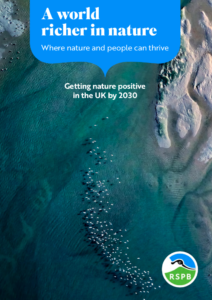
Jack Thompson, Conservation Officer with RSPB in Sussex
On October 24th, the RSPB launched its new report: A World Richer in Nature, identifying how the UK’s leaders need to translate global promises into a decade of action for nature.
Nature is in crisis; both in the UK and globally. According to the State of Nature report (2019) 41% of assessed UK species are in decline and since 1950, 133 species have been lost from our shores completely. With the interconnected issues of a biodiversity and climate crisis we are in a ‘now or never’ time to act. We are on the cusp of agreeing a new global plan for nature that will guide action to 2030; this December, countries will agree and adopt a new global biodiversity framework under the Convention on Biological Diversity (CBD). This report outlines our proposition for how the governments of the UK can drive a nature positive decade of action.
The RSPB has identified six areas for action to focus effort on across the UK and UK Overseas Territories to avoid another lost decade for nature. This is our vision for a nature positive world by 2030:
- SPECIES RECOVERY – We all want a world richer in nature. Sadly, every year there are fewer birds singing, insects buzzing, and fish in our seas.
- PROTECTED AREAS – Our protected areas are fragments of diverse habitats and species and should sit at the heart of nature’s recovery.
- FOOD AND FARMING – Through a change in approach, our farmland has the potential to drive the recovery of nature rather than its decline.
- FISHERIES – Unsustainable fishing practices are putting our much loved seabirds and our marine environments at risk. But with progressive action this can be a thing of the past.
- CLIMATE CHANGE – Our climate is changing at pace. It’s becoming ever clearer that the nature and climate emergencies are deeply intertwined.
- FINANCE – Action needs money: money that is good for nature and that can really accelerate positive change.
What does this mean for the RSPB in Sussex?
Our 2030 vision for nature in Sussex will see internationally important coastal, wetland, woodland, and heathland habitats protected and enhanced. Local authorities, land owners, and other organisations will be working in a coordinated and integrated way, tackling issues around climate change, coastal adaptation, water quality, and development pressures. Farmland will provide for both people and nature, whilst also creating nature-based solutions for climate change and habitat corridor creation, championing species such as turtle dove and their recovery. Landscape-wide delivery of conservation action will be enabled by the Lawton principles of ‘Bigger, Better, More, and Joined up’ through a functional and effective Nature Recovery Network, Local Nature Recovery Strategies, Environmental Land Management schemes, and Biodiversity Net Gain; providing space for species to thrive and populations to be well connected. Local communities will be deeply connected to the landscape and empowered to protect it.
In coastal areas users will be well informed of beach-nesting and wintering birds. Terns, lapwing, and redshank will be breeding in abundance; Dark-bellied Brent geese, curlew, and oystercatcher will be provided with plentiful feeding options in the winter. In woodland and heathland areas communities will be engaged in supporting habitat management and connected with the rich cultural and historical heritage of these habitats. Nightjar, Dartford warbler, and woodlark will breed in a mosaic of heathland, woodland and scrub alongside lesser spotted woodpecker, cuckoo, hawfinch, and spotted flycatcher. Collectively, key species will thrive in a responsibly shared and dynamic landscape.
To find out more information, the RSPB released its new report in a news story, Seven steps to save nature by 2030. You can also read the Full Plan.
